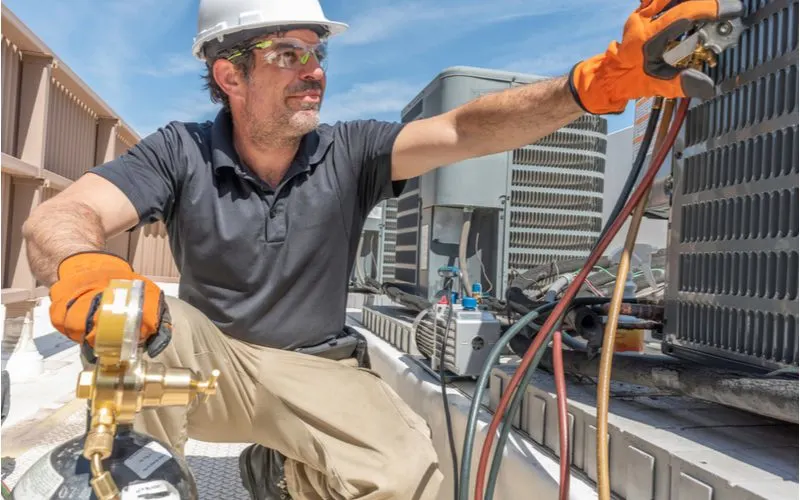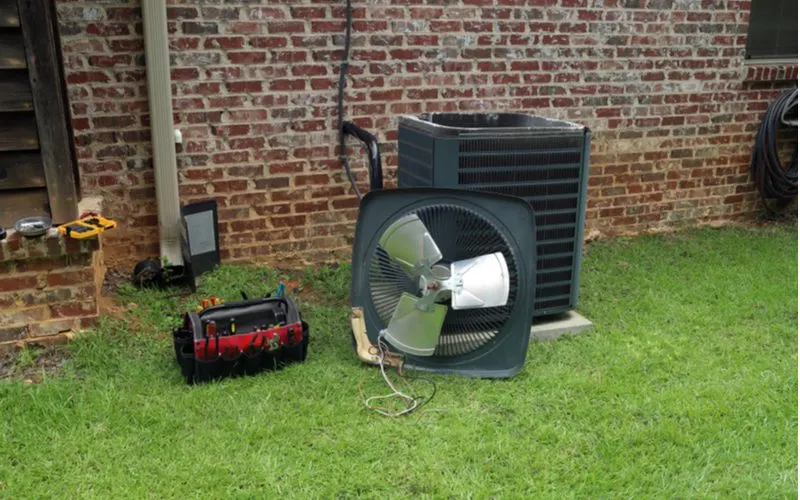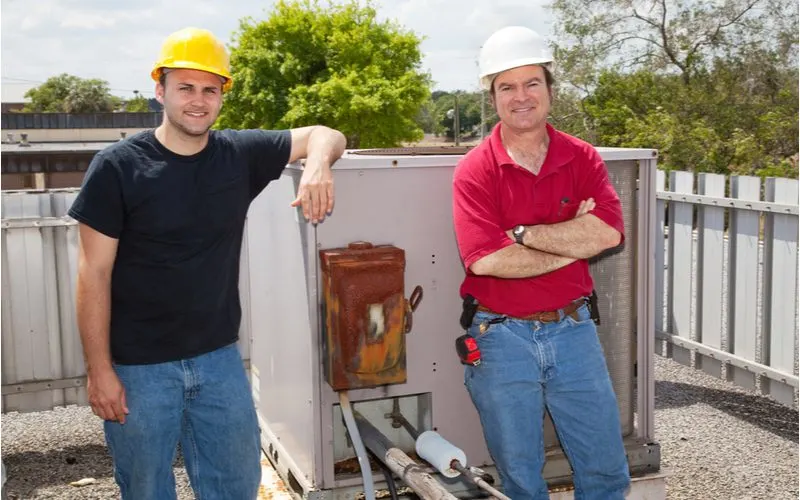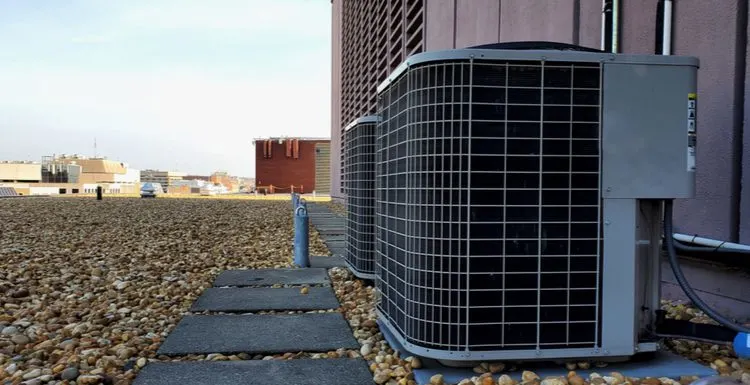If you want a new heating, ventilation, and air conditioning (HVAC) system but don’t know if it’s in your budget, you’re in the right place.
Read on to learn everything you need to know about HVAC installation costs.
What Does HVAC Installation Cost?
The average HVAC installation cost for a new system ranges from $2,500 to $12,000, and a replacement costs between $4,500 and $10,000.
However, pricing depends on a few factors, such as:
- Necessary equipment
- House size, age, and construction
- Climate
- Ductwork length and conditions
- Efficiency rating and brand
- Labor
Factors Affecting HVAC Installation Costs

David Spates/Shutterstock
HVAC installation costs range from $2,500 to $12,000, depending on a handful of factors. You’re unlikely to pay one of the extremes, but you should know where the costs come from.
Necessary Equipment
HVAC units have a number of components that significantly impact the costs. If you have some of them already, you won’t need to pay as much. The items you need depend on the below factors and your desired energy sources.
Here are some of the average prices for equipment needed in an HVAC installation:
- Air Handler. $2,500 to $3,500
- Air-Source Heat Pump. $4,000 to $8,000
- Boiler or Radiator. $1,500 to $3,500
- Central Air Conditioner. $3,350 to $7,600
- Ductless Split AC. $3,000 to $10,000
- Electric Furnace. $1,500 to $5,600
- Furnace and AC Combo. $4,820 to $9,350
- Gas Furnace. $1,500 to $5,000
- Geothermal Heat Pump. $15,000 to $35,000
- Heat Pump. $5,000 to $6,500
- Oil Furnace. $2,500 to $6,500
House Size, Age, and Construction
Larger houses require more powerful HVAC units than smaller ones to fulfill their heating and cooling needs.
Installing a larger system drives up the costs. Older houses may have more fragile roofs, walls, basements, foundations, windows, flooring, and attics.
The weakened structures lack the insulating abilities of newer constructions. Newer homes tend to have more insulation than older ones. Insulation reduces the household energy requirements as you lose less heat to the surroundings.
Consider performing an energy assessment to see where you need insulation in your home and install some. Making your home more energy-efficient allows you to install a smaller HVAC unit, thereby saving money.
Climate
Large countries like the United States have a wide range of climates. If you live in a warm, sunny region, you will have a higher demand for an AC unit rather than a heating system.
Those who live in chilly states may have little need for cooling and instead require a massive heating capacity.
People who live in more moderate and temperate climates may not need much when it comes to either. Determine if you need a furnace, air conditioner, or a more powerful heat pump when calculating your budget.
Ductwork Length and Condition
If you have an HVAC system already, you won’t need to pay for new ductwork. However, the size and condition may not be compatible with your new unit’s requirements.
Installations that require new ductwork have significantly higher costs than those that don’t.
Ductwork costs vary based on the complexity of their installation. If you need it in a structurally weak area or one that’s challenging to access, you’ll pay more.
Furthermore, it’ll take a few more days to complete the ductwork installation, increasing labor costs.
Efficiency Rating and Brand
When it comes to HVAC units, better quality comes at a higher price tag. For the most part, the more expensive brands have higher energy efficiency, or Seasonal Energy Efficiency Ratio (SEER) ratings.
The minimum SEER standards are different for those who live in southern and northern states for cooling efficiencies, but the same for heating.
As a result, you may have to pay more for an HVAC unit in the South compared to the North. High-end brands have a pricier capital cost, but they typically require less maintenance.
Also, they have longer lifespans, more developed technology, and better warranties. They even give you total control over your household temperature.
Don’t skimp on your HVAC unit. One that costs pennies upfront may do little to manipulate your home temperature, increasing your maintenance costs.
Over its lifetime, you may pay more in repairs than if you’d bought an expensive HVAC system first.
Labor
The labor costs depend on how much work needs to be done. If you’re replacing an old system, you’ll pay significantly less than if you everything installed.
Homes with accessible and simple architecture make it easier for HVAC technicians to install the system in your home.
Newer houses with better insulation and high-quality construction require less work to manipulate. How much you’ll pay depends on whether you’ll have master technicians, apprentices, or journeymen working for you.
The average pay for an HVAC technician is $24.32 per hour, and you’ll usually have multiple working on the unit.
Expect to pay between $50 and $150 an hour. The job should take between one and five days to complete. Ductwork can take another one to three days.
Other Costs
Some cities or counties require permits to install HVAC systems. It may need an inspection by a department representative to guarantee your new HVAC unit meets local and national standards.
When performing the installation, the HVAC technicians may need to complete some additional work to mitigate any issues.
They might need to remove an existing system, perform plumbing repairs, move the HVAC system, or do electrical work.
Older houses sometimes have lead paint or asbestos that poses a health risk to technicians and you. If they discover any while completing the installation, they may charge more for its testing, removal, and replacement.
If you choose to upgrade your standard HVAC, you’ll also need to factor in these costs:
- UV Light. $400 to $800
- Variable-Speed Fan. $4,000 to $8,000
- Humidifier. $100 to $300
- Zoning System. $2,500 to $3,500
UV lights can filter out contaminants from the air to boost its quality. A variable-speed fan offers better temperature control.
Humidifiers can help with allergies, and the zoning system can lower your energy bill. While not necessary, many homeowners choose to upgrade their home with these features when upgrading their HVAC unit.
Things to Consider

Chad Robertson Media/Shutterstock
When calculating your HVAC installation cost, you should keep a few things in mind:
- If you have a mobile home, you’ll need specially manufactured parts that won’t work in a larger house.
- Consider some low-cost alternatives like radiant heating, attic fans, and electronic baseboard heaters.
- Most technicians don’t quote you based on the square footage of the system, and they charge for ductwork based on its length.
- Annual maintenance costs are between $50 and $300 each year, but you can perform some maintenance yourself every few months.
- Try to replace the filter, clear surrounding debris, seal air leaks, adjust the thermostat, and spray the external components with a hose.
Frequently Asked Questions

Lisa F. Young/Shutterstock
Here are some frequently asked questions about the HVAC installation cost:
Can I Install HVAC Myself?
If you have experience in plumbing and electrical work, you may be tempted to install it yourself.
However, it takes up to two years of schooling and five years of apprenticeship to become an HVAC technician.
Doing this task yourself may result in electric shock, breaking legal codes, leaky air ducts, and poor efficiency. You shouldn't install HVAC yourself unless you are an HVAC technician.
How Long Does It Take to Install an HVAC System?
If you need to perform a full system installation, it usually takes between three and five days to complete the process. Houses that already have ductwork, central air, or heating systems will not take as long.
Smaller HVAC units take less time to install, as well as ones in accessible areas. The more upgrades you add and the more complex of a space you want it in will drive up the installation time.
Does a New HVAC System Add Value?
If your HVAC system runs at an 80% efficiency or higher, you can use it as a selling point for your home. It’s one less expense that they buyer will have to pay after buying the home.
Can You Put Central Air in a House with No Ductwork?
You can't get central air without ductwork, but you can go for similar alternatives. If you don't want ductwork, you can opt for a mini-split ductless system.
These units are quiet and efficient, similar to those in a hotel room. The HVAC technician can install up to four units in your home with a single exterior compressor.
So, How Much Does HVAC Installation Cost?
HVAC installation costs are generally between $2,500 and $12,000, unless you want to use geothermal heat or add more features.
Now that you know more about the costs, you can estimate the price before getting a quote from a technician.

